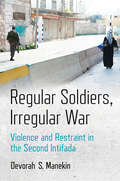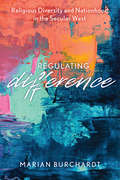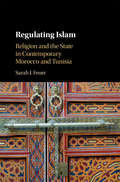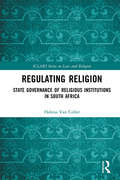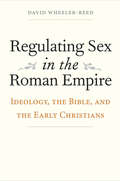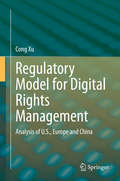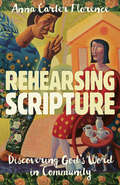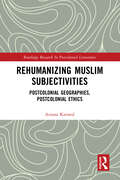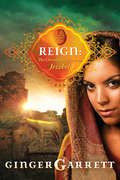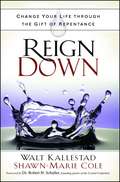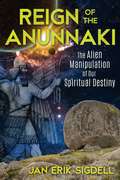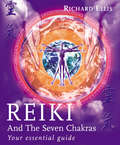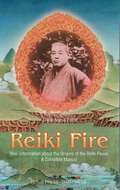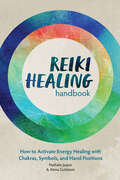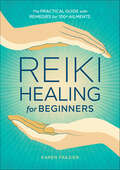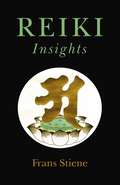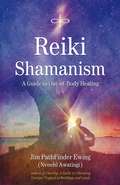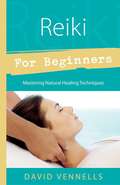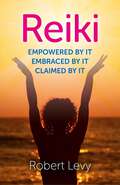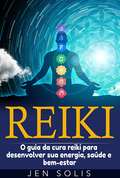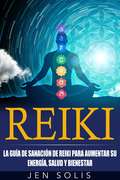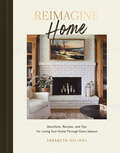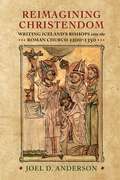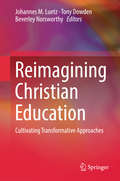- Table View
- List View
Regular Soldiers, Irregular War: Violence and Restraint in the Second Intifada
by Devorah S. ManekinWhat explains differences in soldier participation in violence during irregular war? How do ordinary men become professional wielders of force, and when does this transformation falter or fail? Regular Soldiers, Irregular War presents a theoretical framework for understanding the various forms of behavior in which soldiers engage during counterinsurgency campaigns—compliance and shirking, abuse and restraint, as well as the creation of new violent practices.Through an in-depth study of the Israeli Defense Forces' repression of the Second Palestinian Intifada of 2000–2005, including in-depth interviews with and a survey of former combatants, Devorah Manekin examines how soldiers come both to unleash and to curb violence against civilians in a counterinsurgency campaign. Manekin argues that variation in soldiers' behavior is best explained by the effectiveness of the control mechanisms put in place to ensure combatant violence reflects the strategies and preferences of military elites, primarily at the small-unit level. Furthermore, she develops and analyzes soldier participation in three categories of violence: strategic violence authorized by military elites; opportunistic or unauthorized violence; and "entrepreneurial violence"—violence initiated from below to advance organizational aims when leaders are ambiguous about what will best serve those aims. By going inside military field units and exploring their patterns of command and control, Regular Soldiers, Irregular War, sheds new light on the dynamics of violence and restraint in counterinsurgency.
Regulating Difference: Religious Diversity and Nationhood in the Secular West
by Marian BurchardtTransnational migration has contributed to the rise of religious diversity and has led to profound changes in the religious make-up of society across the Western world. As a result, societies and nation-states have faced the challenge of crafting ways to bring new religious communities into existing institutions and the legal frameworks. Regulating Difference explores how the state regulates religious diversity and examines the processes whereby religious diversity and expression becomes part of administrative landscapes of nation-states and people’s everyday lives. Arguing that concepts of nationhood are key to understanding the governance of religious diversity, Regulating Difference employs a transatlantic comparison of the Spanish region of Catalonia and the Canadian province of Quebec to show how processes of nation-building, religious heritage-making and the mobilization of divergent interpretations of secularism are co-implicated in shaping religious diversity. It argues that religious diversity has become central for governing national and urban spaces.
Regulating Islam: Religion and the State in Contemporary Morocco and Tunisia
by Sarah J. FeuerMany countries in the Arab world have incorporated Islam into their state- and nation-building projects, naming it the 'religion of the state'. Regulating Islam offers an empirically rich account of how and why two contemporary Arab states, Morocco and Tunisia, have sought to regulate religious institutions and discourse. Drawing on a range of previously unexamined sources, Sarah J. Feuer traces and analyzes the efforts of Moroccan and Tunisian policymakers to regulate Islamic education as part of the respective regimes' broader survival strategies since their independence from French rule in 1956. Out of the comparative case study emerges a compelling theory to account for the complexities of religion-state dynamics across the Arab world today, highlighting the combined effect of ideological, political, and institutional factors on religious regulation in North Africa and the Middle East. The book makes an important and timely contribution to the on-going scholarly and policy debates concerning religion, politics, and authoritarian governance in the post-uprisings Arab landscape.
Regulating Religion: State Governance of Religious Institutions in South Africa (ICLARS Series on Law and Religion)
by Helena Van CollerThis book focuses on government regulation of religious institutions in South Africa. PART 1 explains the meaning of government regulation for religious communities by providing a brief overview of the relationship between church and state, the right to freedom of religion and the legal status of religious organisations. With reference to case examples, this section highlights the importance of religious autonomy and the right to self-determination of religious institutions and non-interference by the state in the internal affairs of the organisation. No fundamental rights are however absolute and the section concludes with a discussion on the limitation of rights and an overview of the relevant constitutional provisions and anti-discrimination laws in place relevant to religious organisations, in the context of equality and non-discrimination. PART 2 discusses in more detail the daily rights, responsibilities and freedoms associated with the right to freedom of religion within some specific spheres of society where regulation of religion has occurred or are necessary or has proved to be problematic. It includes those related to the role of religion in society; the relations between religion and state institutions; education; finance; family matters; employment law; planning law; broadcast media and general governance issues.
Regulating Sex in the Roman Empire: Ideology, the Bible, and the Early Christians
by David Wheeler-ReedA New Testament scholar challenges the belief that American family values are based on “Judeo-Christian” norms by drawing unexpected comparisons between ancient Christian theories and modern discourses Challenging the long-held assumption that American values—be they Christian or secular—are based on “Judeo-Christian” norms, this provocative study compares ancient Christian discourses on marriage and sexuality with contemporary ones, maintaining that modern family values owe more to Roman Imperial beliefs than to the bible. Engaging with Foucault’s ideas, Wheeler-Reed examines how conservative organizations and the Supreme Court have misunderstood Christian beliefs on marriage and the family. Taking on modern cultural debates on marriage and sexuality, with implications for historians, political thinkers, and jurists, this book undermines the conservative ideology of the family, starting from the position that early Christianity, in its emphasis on celibacy and denunciation of marriage, was in opposition to procreation, the ideological norm in the Greco-Roman world.
Regulatory Model for Digital Rights Management: Analysis of U.S., Europe and China
by Cong XuThis book highlights the shortcomings of the present Digital Rights Management (DRM) regulations in China. Using literature reviews and comparative analysis from theoretical and empirical perspectives, it appraises different DRM restriction regulations and practices as well as current advice on balance of interests to analyze the dilemma faced by the DRM system.This research intends to help China establish a comprehensive DRM regulatory model through comparative theoretical and empirical critiques of systems in America and Europe. A newly designed DRM regulatory model should be suitable for specific Chinese features, and should consist of government regulated, self-regulated, and even unregulated sections. The new regulation model might be an addition to existing legal structures, while self-regulations/social enforcement also would be as important as legislation based on case studies.
Rehearsing Scripture: Discovering God's Word in Community
by Anna Carter FlorenceSCRIPTURE. We can study it carefully. We can listen to sermons on it and read what the experts say about it. But in the end, says Anna Carter Florence, Scripture needs to be rehearsed and encountered—and we can do that best in community with others. In this book Florence offers concrete, practical tools for reading and rehearsing Scripture in groups. Suitable for new and seasoned Bible readers alike, Florence&’s Rehearsing Scripture invites solitary readers to become community readers as well—to gather around a shared text and encounter God anew together.
Rehearsing Scripture: Discovering God's Word in Community
by Anna Carter FlorenceSCRIPTURE. We can study it carefully. We can listen to sermons on it and read what the experts say about it. But in the end, says Anna Carter Florence, Scripture needs to be rehearsed and encountered—and we can do that best in community with others. In this book Florence offers concrete, practical tools for reading and rehearsing Scripture in groups. Suitable for new and seasoned Bible readers alike, Florence&’s Rehearsing Scripture invites solitary readers to become community readers as well—to gather around a shared text and encounter God anew together.
Rehumanizing Muslim Subjectivities: Postcolonial Geographies, Postcolonial Ethics (Routledge Research in Postcolonial Literatures)
by Aroosa KanwalRehumanizing Muslim Subjectivities: Postcolonial Geographies, Postcolonial Ethics is a timely and urgent monograph, allowing us to imagine what it feels like to be the victim of genocide, abuse, dehumanization, torture and violence, something which many Muslims in Palestine, Kashmir, Pakistan, Myanmar, Syria, Iraq and China have to endure. Most importantly, the book emphasizes the continued relevance of creative literature’s potential to intervene in and transform our understanding of a conceptual and political field, as well as advanced technologies of power and domination. The book makes a substantial theoretical contribution by drawing on wide-ranging angles and dimensions of contemporary drone warfare and its related catastrophes, postcolonial ethics in relation to the thanatopolitics of slow violence, dehumanization and the politics of death. Against the backdrop of such institutionalized and diverse acts of violence committed against Muslim communities, I call the postcolonial Muslim world ‘geographies of dehumanization’. The book investigates how ongoing legacies of contemporary forms of injustice and denial of subjecthood are represented, staged and challenged in a range of postcolonial anglophone Muslim texts, thereby questioning the idea of postcolonial ethics. One of the selling points of this book is the chapters on fictional representations by Muslim Myanmar and Uyghur writers as, to the best of my knowledge, no critical work or single authored book is available on Myanmar and Uyghur literature to date.
Reign
by Ginger GarrettBeyond the Drama, Her Heart Was RealFrom the moment her marriage to prince Ahab thrusts her into the intrigues of palace life, Jezebel's exotic beauty opens doors and her will breaks down walls. Torn from her homeland and wed to power in a strange country, Jezebel vows to create a legacy and power all her own. Some might call her a manipulative schemer, bent on having her way. But they don't know the whole story, and she was much, much worse. As she moves through the halls of power, her heart struggles between devotion to the gods she worships, the prince who loves her, and her thirst for revenge. She sparks a battle between her strangely powerless gods and the God of palace administrator Obadiah--a God who confronts her with surprising might. She will fight, though victory may cost her everything.
Reign Down: Change Your Life Through the Gift of Repentance
by Walt Kallestad Shawn-Marie Cole Robert SchullerThe Key to Heaven's Door In your possession, you have a powerful key -- a key that unlocks heaven's door and grants you instant and free access to the throne room of God. What is this key? Quite simply, it is repentance -- the kind of repentance that will change your life and cure your problems. Regardless of where life has taken you, God stands ready to take the mistakes of your past and create for you an incredible future. In the pages of this revolutionary book you'll find out how. The Gift of Repentance Is there a yearning deep in your heart that nothing can satisfy -- a craving for something more? This revolutionary book will help you explore that yearning and will powerfully demonstrate that this unsatisfied need is a part of every heart that is not yet one with God. As you receive God's gift of repentance, you will find peace, fulfillment, and a new beginning. The process is simple to start and is clearly explained inside these pages. As you bring your broken heart to God, He will fill your life with blessings galore: Peace Fulfillment Purpose Direction Meaning Satisfaction All this can be yours as you learn how to accept God's powerful gift of repentance and open your heart to all that He has for you.
Reign of the Anunnaki: The Alien Manipulation of Our Spiritual Destiny
by Jan Erik SigdellReveals the ongoing alien manipulation of humanity and how we can break free • Explores how the Anunnaki have maintained invisible surveillance over us and how they control our development through religion, secret societies, and catastrophes • Reveals how they feed off our energies and how this ability has allowed them to remain here on Earth as multidimensional entities, enforcing their control invisibly • Explains how they established religion to control us and how Gnostic Christianity--which came from Christ and not the Anunnaki--offers a way out of their matrix of control Cuneiform texts found on clay plates in Mesopotamia tell us about an extraterrestrial race, called the Anunnaki, who came from space to exploit our planet. Through genetic manipulation, they created modern humans from existing earthly life forms to serve them as slaves. They physically left our planet millennia ago, but as Jan Erik Sigdell reveals, their influence and control over humanity is still pervasive and significant. Sigdell explains how the Anunnaki have maintained invisible surveillance over us as well as control over how humanity develops, setting limits on our evolution and holding back our development by means of manipulation and catastrophes, including the deluge immortalized in the Bible and many other ancient myths. He shows how they still manipulate our politics and affairs via secret societies, such as the Illuminati, and the political elite, such as the Bilderberg Group. Examining ancient descriptions of the Anunnaki as entities that resemble winged reptiles or amphibians, the author also explores their diet and how they feed off blood and the energies given off by lower life forms, such as humans, when they are expressing extreme negative emotions, having sex, or dying. This energy-feeding ability has allowed them to remain here on Earth as multidimensional entities, enforcing their control invisibly. He explains how the Anunnaki established religions as tools for control, setting up the major religions with themselves as “gods” and playing them against each other to keep humanity’s attention away from ongoing Anunnaki manipulation. They have also hidden from us the existence of the true highest creator, who created the cosmos as well as the Anunnaki themselves. The author reveals how the highest creator sent a messenger called Jesus to expose the Anunnaki and show us a way out of their matrix of control through a spirituality based on love, empathy, and sacred sexuality. But the “god” of the Anunnaki defeated this messenger and replaced him with a false Christ. This led to the development of Paulinian Christianity under Anunnaki influence, as well as other parallel religions such as Islam, and the suppression and elimination of the original Christianity, Gnostic Christianity. With the discovery of hidden Gnostic texts and teachings at Nag Hammadi in 1945, the way is now paved for our release from the reign of the Anunnaki.
Reiki And The Seven Chakras: Your Essential Guide to the First Level
by Richard EllisReiki is a unique system of healing that allows you to harness and transmit energy through your hands, restoring balance and harmony within the body and bringing relief to a wide range of physical and emotional problems. This book, by renowned Reiki teacher Richard Ellis, illustrates all the hand positions used for the first level of Reiki, but it goes much further and shows them in their relation to the seven chakras. Chakras are the main energy points of the body and provide the anatomy of energy healing. These are different for everyone, and so to practise Reiki effectively you need to understand a person's chakras, which will in turn explain the type of person they are and the health problems they are vulnerable to. For example, one person may have an excessive first chakra, making them prone to obesity or digestive problems, and to pessimism, while another may be deficient, making them vulnerable to anorexia and restlessness. You would therefore approach these two people differently. Reiki and the Seven Chakras captures the feeling of wonder that surrounds Reiki, but it is also an immensely practical guide. So many of the current books on Reiki are very dry, following a formula of detailing the history of Reiki healing and then showing you how to do it. This one breaks the mould and is written from a very personal point of view, which makes it incredibly interesting to read and also very accessible – essential if you are to understand the true nature and potential of Reiki.
Reiki Fire: New Information about the Origins of the Reiki Power: A Complete Manual
by Frank Arjava PetterThe author, a Reiki master practicing in Japan, traces the origins in a new light following the path of Usuisan back in time through meetings with his descendants and climbing the holy mountain of his enlightenment.
Reiki Healing Handbook: How to Activate Energy Healing with Chakras, Symbols, and Hand Positions
by Nathalie Jaspar Alena GoldsteinBalance your mind and body—unlock the power of Reiki Whether you're looking to relieve stress, practice more gratitude, or boost general well-being, the Reiki Healing Handbook can help. Reiki is a Japanese healing practice that restores the flow of energy between your body, mind, and spirit. This Reiki reference book will show you how to align your chakras (energy centers) and incorporate symbols and hand positions into a balanced routine. You'll learn how to clear your mind and focus your energy where it's needed so you can reduce negative thoughts and feelings, and start healing. Reiki Healing Handbook includes: The 5 precepts—Learn about the five core principles of Reiki: Just for today: do not anger, do not worry, be grateful, practice diligently, and show compassion. Guided techniques—Beautiful illustrations show you the proper way to perform the hand positions and engage different chakras. Mix and match—Find tips for adding crystals, yoga, essential oils, and other tools to your practice for stronger energy flow. Improve your energy flow and start healing with Reiki.
Reiki Healing for Beginners: The Practical Guide with Remedies for 100+ Ailments
by Karen FrazierLearn to treat over 100 physical and emotional ailments with remedies from Reiki Healing for Beginners.Reiki Healing for Beginners shows new reiki practitioners how to put theory into practice and start healing body, mind, and soul. This application-focused beginner's handbook explores basic reiki techniques, and teaches you how to heal over 100 common emotional and physical ailments with reiki. Through clear, step-by-step instructions—fully illustrated—this practical guide is the perfect companion for new reiki practitioners who learn by doing.From aches and pains to abundance and prosperity, reiki places the power to heal in your hands. Learn how to use reiki to heal yourself and others with:Remedies for 100+ ailments that provide clear instruction for treating physical and mental afflictions with reikiBasic reiki techniques that offer simple, step-by-step guidance on hand positions for reiki healingAn essential introduction that teaches you fundamental information on the history and principles of reikiTake a hands-on approach to healing with over 100 remedies from Reiki Healing for Beginners.
Reiki Insights
by Frans StieneA meditative journey into the inner depths of the system of Reiki. Reiki Insights is presented as a series of short chapters, each of them a teaching, so that you can pick it up, choose a chapter and read it. After you have read the chapter, sit down and meditate upon the words. Let them sink deep into your mind, body, and energy, so that you can feel what is in between the sentences. By reading and experiencing Reiki Insights in this way, it will lay a foundation for inner change, from not knowing your true self to knowing your true self.
Reiki Shamanism
by Jim Pathfinder EwingAnyone with a rudimentary knowledge of either Reiki or shamanism will learn how to heal people, places, and things, whether at hand or from a distance, in this useful guide. Presented by an expert in both traditions, the techniques of Reiki and the principles of shamanism are explained in simple, concise terms, then brought together using real-life examples to show how Reiki can be practiced within the shamanic journey. Supported by mastery exercises, references to other books, and internet resources, both novices and experienced practitioners will expand their knowledge and ability to help subjects clear old energies and accelerate their "soul purpose."
Reiki for Beginners: Mastering Natural Healing Techniques (Llewellyn's For Beginners)
by David VennellsMillions of people worldwide have already benefited from the healing practice of Reiki. With the help of this introductory Reiki book, you can learn the basic principles of this simple, yet profound system for healing and spiritual growth that works on an energetic level. Make the most of Reiki from a practical point of view as you explore its spiritual essence:Heal yourself and others physically, mentally, and emotionallyDevelop compassion and wisdomHeal plants and animalsResolve relationship issues at work or homeComplement and strengthen other therapiesSend healing energy to local or world situations such as war, natural disasters, crime, or povertyBe blessed, guided, and protectedWinner of the Coalition of Visionary Resources (COVR) Award for Best Alternative Health Book
Reiki: Empowered By It, Embraced By It, Claimed By It
by Robert LevyDo you think Universe, in her ultimate wisdom, would present humanity with the wonderful gift of Reiki and then dictate that everyone use it and practice it in the exact same way? For the author, the answer is no. Each of us is an individual and when transmitting Reiki, the Universal Life Force Energy must take into account our individual differences. Reiki is not a static energy but a fluid one. For the author Reiki is a personal healing system, based on his relationship with Universe and the gift she gave him. And her gift is not a generic one. It is a personal one. That is the reason this book was written - to show the reader how to connect directly with the Reiki Energy and claim the personal gift the author believes you are entitled to.
Reiki: O guia da cura reiki para desenvolver sua energia, saúde e bem-estar
by Jen SolisFrequentemente temos consciência de que estamos desequilibrados de alguma forma mas não conseguimos entender porquê. Dor, por exemplo, é uma manifestação física de desequilíbrio energético. Doenças também podem ser um efeito colateral, já que o sistema imunológico é comprometido. A cura Reiki é algo que pode ser praticado com segurança no dia-a-dia e se você não se sente bem, o Reiki pode ajudá-lo a se recuperar mais rapidamente. O guia da cura reiki pode ajudá-lo a alcançar bem-estar físico e mental através de técnicas que vamos lhe mostrar. A melhor parte do Reiki é que mesmo que você esteja focado em curar uma parte de sua vida, os seus esforços irão afetar todas as partes de sua vida e naturalmente retornar para o equilíbrio. Uma vez que você estiver familiarizado com o processo de equilíbrio, você pode inclusive doar energia a outros usando as técnicas de sintonização que manipulam o campo energético e permitem que você interaja com a energia diretamente. Há muitas técnicas orientais que trabalham com a energia Qi, então por que escolher o Reiki? Você descobrirá isto e mais neste livro.Neste livro você encontrará as respostas para essas perguntas e mais. Algumas das questões e tópicos são: Reiki básico Cura com Reiki Energia Qi Chakras Claridades e cristais Clarividência Clarisciência Clariaudiência Claricognição Praticando Reiki O processo de sintonizaçãp Nível 2 Nível 3/Mestre Reiki Escaneamento do corpo (body scans) Escaneamento de Auras Escaneamento com pêndulos E mais!
Reiki: la guía de sanación de Reiki para aumentar su energía, salud y bienestar
by Romina P. Piscione Jen SolisSolemos ser conscientes de que nos sentimos desequilibrados de alguna manera, pero no podemos entender por qué. El dolor, por ejemplo, es una manifestación física del desequilibrio energético. La enfermedad también puede ser un efecto secundario de esto, ya que compromete el sistema inmune. La curación con Reiki es algo que se puede practicar de forma segura todos los días, y si no se siente bien, el Reiki puede ayudar a que se recupere y se sienta mejor más rápido. La Guía de sanación de Reiki puede ayudarle a lograr un mejor bienestar físico y mental a través de las técnicas que estamos a punto de mostrarle. Lo bueno del Reiki es que incluso cuando se enfoca en sanar una parte de su vida, sus esfuerzos afectarán todas las partes de su vida y las ayudará a regresar naturalmente a un equilibrio óptimo. Una vez que esté familiarizado con el proceso de equilibrio, también puede dar energía a otros mediante la utilización de técnicas de sintonización que manipulan el campo de energía y le permiten interactuar directamente con ella. Hay muchas técnicas orientales que dependen de la energía Qi, ¿por qué elegir Reiki? Descubrirá todo eso y más aquí. En este libro encontrará las respuestas a estas preguntas y más. Algunas de las preguntas y temas incluidos son: Los fundamentos del Reiki Curación con Reiki Energía Qi Chakras Claros y cristales Clarividencia Clarisentencia Clariaudiencia Claricognisencia Practicar Reiki El procedimiento de sintonización Nivel 2 Nivel 3 /Master Reiki Escaneos corporales Escaneo de aura Escaneo de péndulo ¡Y más! ¡No dude en recoger su copia hoy!
Reimagine Home: Devotions, Recipes, and Tips for Loving Your Home Through Every Season
by Sarabeth GalimbaSimplify your home and experience the peace God wants for you in every season with twenty-eight encouraging devotions, practical decorating tips, and stunning photography.Home—whether a camper van, mansion, or anything in between—is where we recharge and rest, where we learn and grow, and where we welcome others. And for Christians, our home should be a small reflection of God's kingdom on earth. Unfortunately, our homes often feel anything but peaceful, ordered, or representative of who we are. If this sounds familiar, consider Reimagine Home a gift of inspiration and your personal invitation to quiet all voices of comparison and tune in to what really matters when it comes to your home—creating a space where you can know the love of God and share that love with others. With twenty-eight devotions that span the four seasons of the year, Reimagine Home encourages you to begin creating the home you want on a schedule that works for you, offering customizable tactics, helpful tips, and an undated format. Accompanied by beautifully inspiring, full-color photographs that inspire peace instead of perfection, this devotional provides a sense of calm to each day.As you read each short reflection and explore the practical home styling tips, you will be inspired to curate a home that reflects who you are and welcomes others the moment they walk in the door.
Reimagining Christendom: Writing Iceland's Bishops into the Roman Church, 1200-1350 (The Middle Ages Series)
by Joel D. AndersonWith its expanding legal system and its burgeoning throngs of lawyers, legates, and documents, the papacy of the thirteenth and fourteenth centuries has often been credited with spearheading a governmental revolution that molded the high medieval church into an increasingly disciplined, uniform, and machine-like institution. Reimagining Christendom offers a fresh appraisal of these developments from a surprising and distinctive vantage point. Tracing the web of textual ties that connected the northern fringes of Europe to the Roman see, Joel D. Anderson explores the ways in which Norse writers recruited, refashioned, and repurposed the legal principles and official documents of the Roman church for their own ends.Drawing on little-known vernacular sagas, Reimagining Christendom is populated with tales of married bishops, fictitious and forged papal bulls, and imagined canon law proceedings. These narratives, Anderson argues, demonstrate how Norse writers adapted and reconfigured the institutional power of the church in order to legitimize some of the thoroughly abnormal practices of their native bishops. In the process, Icelandic clerics constructed their own visions of ecclesiastical order—visions that underscore the thoroughly malleable character of the Roman church’s text-based government and that articulate diverse ways of belonging to the far-flung imagined community of high medieval Christendom.
Reimagining Christian Education: Cultivating Transformative Approaches
by Johannes M. Luetz Tony Dowden Beverley NorsworthyThis book is an arresting interdisciplinary publication on Christian education, comprising works by leading scholars, professionals and practitioners from around the globe. It focuses on the integrated approaches to Christian education that are both theoretically sound and practically beneficial, and identifies innovative pedagogical methods and tools that have been field-tested and practice-approved. It discusses topics such as exploring programmes and courses through different lenses; learning challenges and opportunities within organisational management; theology of business; Christian models of teaching in different contexts; job preparedness; developing different interpretive or meaning-making frameworks for working with social justice, people with disability, non-profit community organisations and in developing country contexts. It offers graduate students, teachers, school administrators, organisational leaders, theologians, researchers and education practitioners a fresh and inspiring reimagining of Christian education perspectives and practices and the ramifications of their application to life-long learning.
